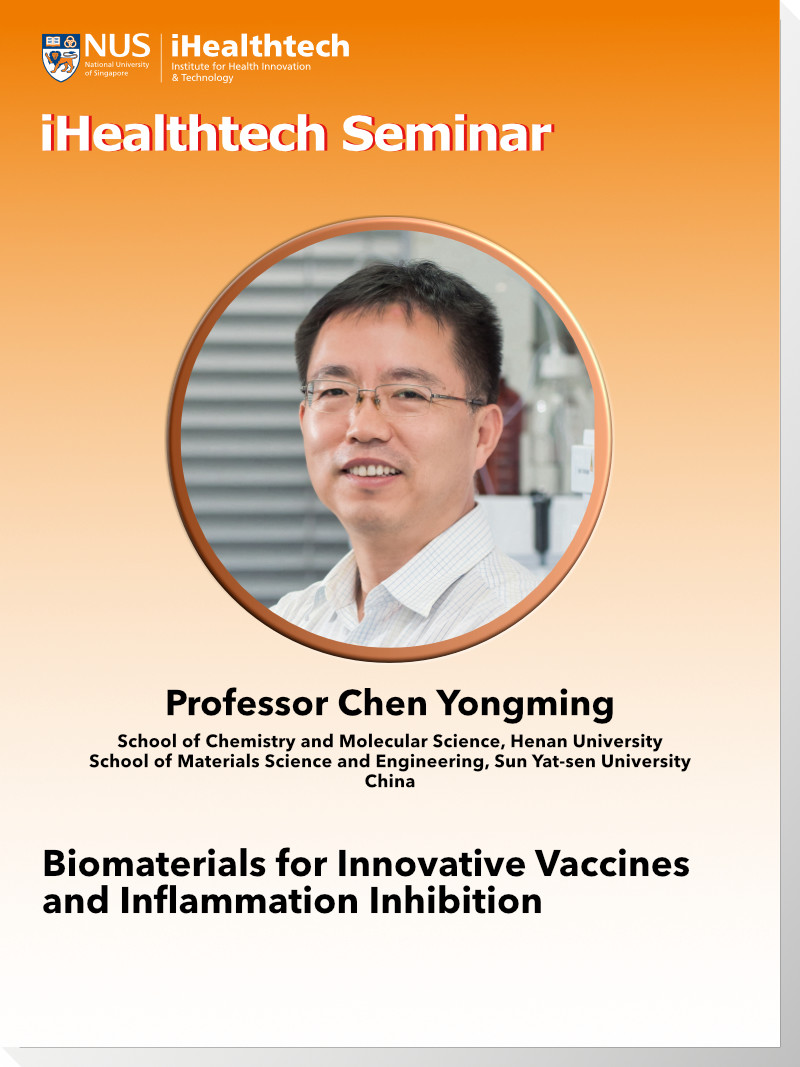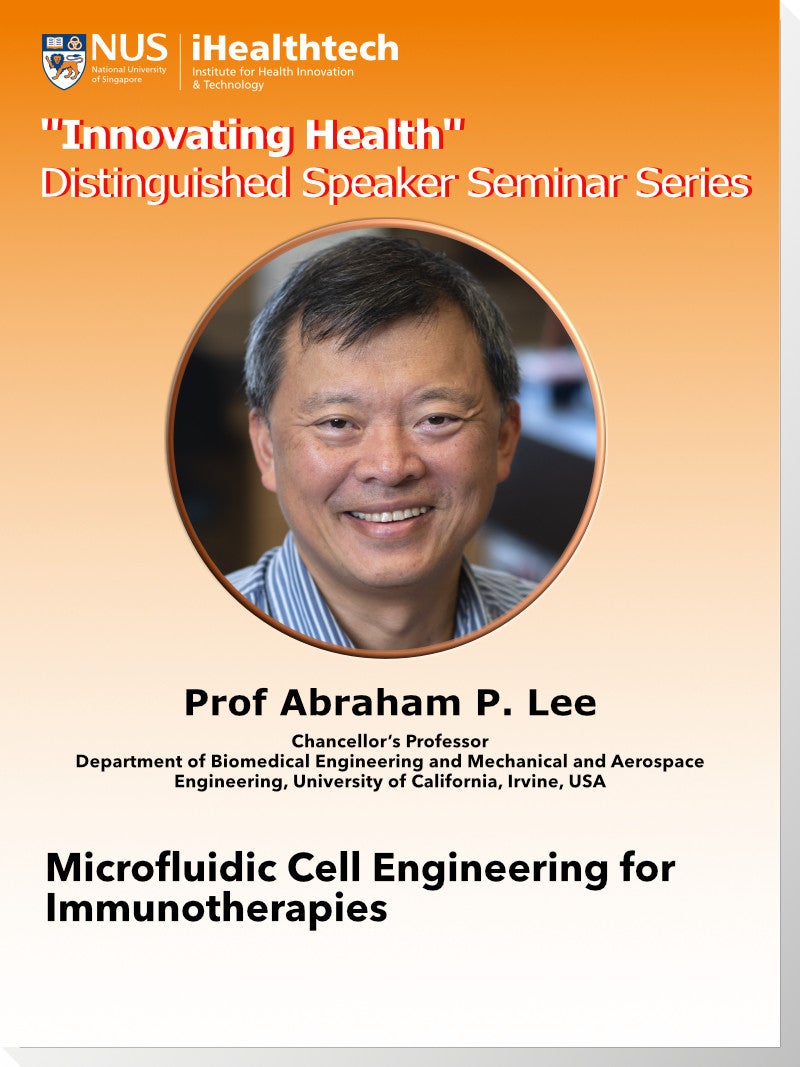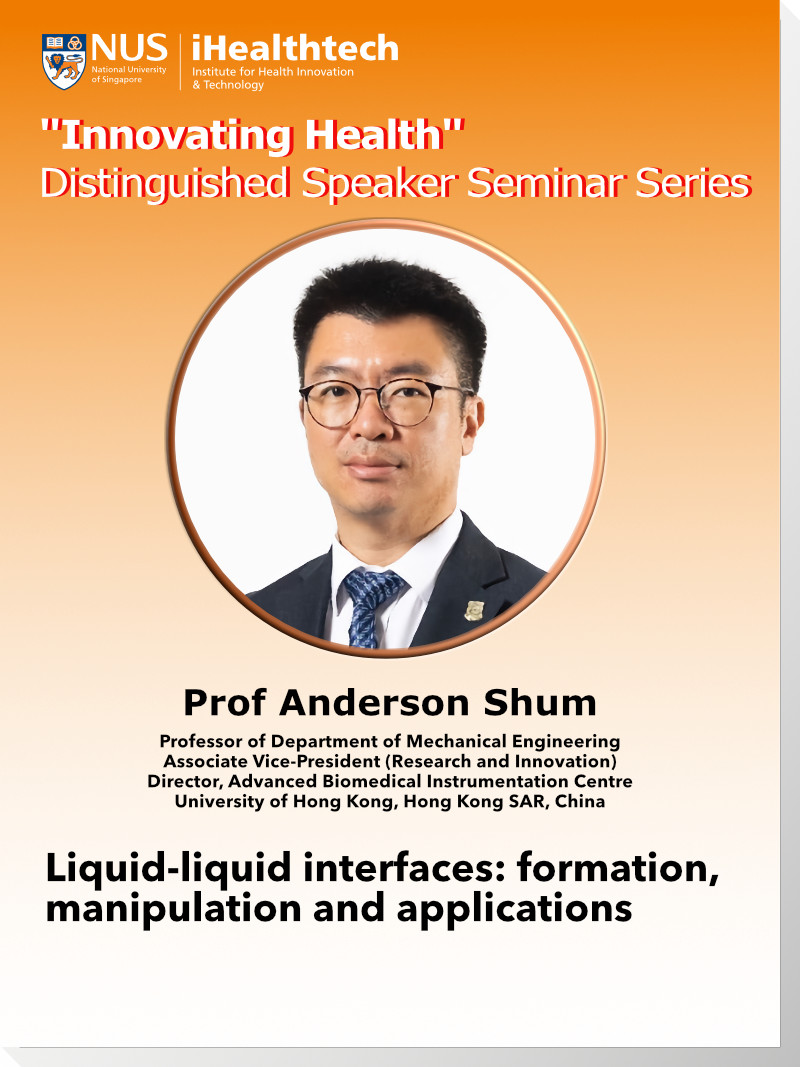Wearable Technology Workshop 2021

We are pleased to announce that the virtual WEARABLE TECHNOLOGY WORKSHOP 2021 will happen on Tuesday, 6 July.
Please join us in this exciting event that focuses on the latest wearable technology for health. This event is brought to you by NUS iHealthtech and HealthTEC, and sponsored by Huawei.
Registration is now open. Please click HERE to register.
Speakers’ Info
Prof Joseph WANG
SAIC Endowed Chair, Distinguished Professor, Department of Nanoengineering, University of California San Diego
Joseph Wang is Distinguished Professor, SAIC Endowed Chair, and former Chair of the Department of Nanoengineering at the University of California, San Diego (UCSD). He is also the Director of the UCSD Center of Wearable Sensors. He served as the director of Center for Bioelectronics and Biosensors of Arizona State University (ASU) before joining UCSD. Prof. Wang has published more than 1100 papers, 11 books and he holds 25 patents (H Index=169, >120,000 citations). He received 2 American Chemical Society National Awards in 1999 (Instrumentation) and 2006 (Electrochemistry), ECS Sensor Achievement Award (2018) and 5 Honorary Professors from Spain, Argentina, Czech Republic, Romania, China and Slovenia. Prof. Wang is also an RSC and ECS Fellow and has been the Founding Editor of Electroanalysis (Wiley). His scientific interests are concentrated in the areas of bioelectronics, biosensors, bionanotechnology, nanomachines, and electroanalytical chemistry.
Assoc Prof OUYANG Jianyong
Department of Materials Science and Engineering, National University of Singapore
Prof Jianyong Ouyang received his PhD, master and bachelor degrees from the Institute for Molecular Science in Japan, the Institute of Chemistry of the Chinese Academy of Science, and the Tsinghua university in Beijing, respectively. He worked as an assistant professor at the Japanese Advanced Institute of Science and Technology and a postdoctoral researcher at the University of California, Los Angeles (UCLA) before joining the National University of Singapore (NUS) as an assistant professor in 2006. He was promoted to associate professor with tenure in 2012. His research interests include flexible electronics and energy materials and devices. He invented the first polymer/nanoparticle memristor in 2004, the first hybrid ionic/electronic thermoelectric converter in 2020, the first adhesive intrinsically conducting polymers in 2020 and the first application of flexible strain sensors for food processing monitoring in 2021 in the world, and continuously reported world-record conductivities and thermoelectric properties of solution-processable intrinsically conductive polymers and world-record thermoelectric properties of ionic conductors.
Dr YEO Joo Chuan
Translational Manager (HATCH), iHealthtech; Co-founder, Microtube Technologies and Flexosense
Dr Yeo Joo Chuan’s research focuses on deep technologies, ranging from stretchable electronics, wearable sensors, microfluidic devices, and artificial intelligence. He has over 20 publications and 5 patents to his credit.
Currently, as the Translational Manager of the Institute for Health Innovation & Technology at the National University of Singapore, his passion involves product innovation and commercialization using emerging technologies. Beyond his research, he is also a serial entrepreneur, having co-founded two tech start-ups that focus on wearable sensors for health monitoring and gaming.
Prof CHEN Xiaodong
President’s Chair Professor in Materials Science and Engineering, Nanyang Technological University, Singapore; Director, Max Planck – NTU Joint Lab for Artificial Senses, Nanyang Technological University, Singapore; Director, Innovative Centre for Flexible Devices (iFLEX), Nanyang Technological University, Singapore.
Prof Chen Xiaodong is the President’s Chair Professor in Materials Science and Engineering, Professor of Chemistry (by courtesy) and Medicine (by courtesy) at Nanyang Technological University, Singapore (NTU), and Scientific Director at the Institute of Materials Research and Engineering, Agency for Science, Technology and Research (A*STAR). He is the Director of Innovative Centre for Flexible Devices (iFLEX) at NTU, the Director of Max Planck – NTU Joint Lab for Artificial Senses, and Deputy Director of Singapore Hybrid-Integrated Next-Generation μ-Electronics (SHINE) Center.
He received his B.S. degree (Honors) in chemistry from Fuzhou University (China) in 1999, M.S. degree (Honors) in physical chemistry from the Chinese Academy of Sciences in 2002, and Ph.D. degree (Summa Cum Laude) in biochemistry from University of Muenster (Germany) in 2006. After his postdoctoral fellow working at Northwestern University (USA), he started his independent research career as Nanyang Assistant Professor at Nanyang Technological University since 2009. He was promoted to Associate Professor with tenure in Sept 2013, then Full Professor in Sept 2016. He was appointed as the President’s Chair Professor in Materials Science and Engineering in April 2019. His research interests include mechano-materials science, senses digitalization, flexible electronics technology, and cyber-human interfaces.
He has been elected as a Fellow of the Academy of Engineering Singapore and a Fellow of Royal Society of Chemistry in UK. In addition, he was recognized by multiple prestigious awards and honors including Singapore NRF Investigatorship, Small Young Innovator Award, Singapore NRF Fellowship, Nanyang Research Award, LubrizolYoung Materials Science Investigator Award, Mitsui Chemicals-SNIC Industry Award in Materials and Nano-chemistry,and Friedrich Wilhelm Bessel Research Award from Alexander von Humboldt Foundation.
Asst Prof SHAO Huilin
NUS Presidential Young Professor, Department of Biomedical Engineering, Faculty of Engineering and Department of Surgery, Yong Loo Lin School of Medicine, National University of Singapore
Dr Huilin Shao received her BA from Cornell University, with a double major in Biological Sciences and Physics. She completed her dual PhD (Biophysics) at Harvard University and PhD (Medical Engineering) from Harvard-MIT Health Sciences and Technology (HST) under the guidance of Prof Ralph Weissleder and Prof Robert S. Langer. After a postdoctoral fellowship with Prof Hakho Lee at Massachusetts General Hospital, Harvard Medical School, Dr Shao returned to Singapore and started her research group. Her research focuses on developing integrated nanotechnology-based platforms for molecular analyses of novel biomarkers. Her work has been published in top journals such as Nature Biotechnology, Nature Nanotechnology, Nature Medicine, Nature Biomedical Engineering, Nature Communications and highlighted in major reviews and popular news media.
Assoc Prof Raymond SEET Chee Seong
Deputy Director, Healthy Longevity Research Programme, National University of Singapore; Research Programme Director, Divition of Neurology, University Medicine Cluster, National University Hospital, Singapore.
Dr Raymond Seet is a consultant at the Division of Neurology at the National University Hospital, and holds the academic rank of Associate Professor at the National University of Singapore, Yong Loo Lin School of Medicine. He is Research Director of Neurology at the University Medicine Cluster and runs a clinical translational research laboratory at the National University of Singapore. He attended the National University of Singapore where he received his MBBS degree. He underwent Internal Medicine training followed by advanced specialty training in Neurology in Singapore, and was admitted to the Royal College of Physicians in the United Kingdom and the Academy of Medicine, Singapore. Between 2010 and 2012, he was a fellow at the Mayo Clinic, Rochester, United States, where he received additional subspecialty training and studied neurocritical care, specializing in stroke management. Dr Seet’s research stems from his active clinical neurology practice that is centered on patients with cerebrovascular disease. The focus of his research is to improve the care of stroke patients, ranging from neuroprotection, optimization of clinical management and post-stroke recovery. His research has contributed to the understanding of stroke biology and management. By targeting key pathogenic processes, he hopes to deliver novel and practical approaches in the treatment of ischaemic stroke. His findings have been published in over 130 international peer-reviewed articles, including Circulation, Stroke, JAMA Neurology, Annals of Neurology and Neurology. In additional to clinical and translational research, he has participated in numerous industry and investigator-initiated trials in stroke. In 2009, he received the Researcher Investigator Scientist Enabler (RISE) Award and, in 2012, he was awarded the National Medical Research Council-Clinician Scientist Award (NMRC-CSA). Dr Seet contributes actively to medical education and lectures undergraduates, post-graduates and specialists. He has special interest in bedside clinical teaching and clinical assessments. He attended the Harvard Medical International and the Royal College of Physician Programmes for Physician Educators. In 2008, he received the best poster presentation award at the 5th Asia-Pacific Medical Education Conference and, in 2008 and 2014, he was awarded both the faculty and university awards for teaching excellence (Faculty Teaching Excellence Award and Annual Teaching Excellence Award. (Link)






